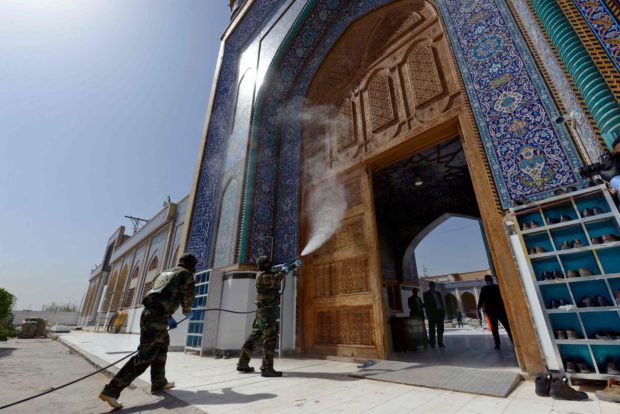Virus crisis ebbs in China, spreads fear across the West

CONTAGION IN IRAQ A member of the Iraqi civil defense sprays disinfectant on and around the Great Mosque of Kufa, 10 kilometers northeast of the shrine city of Najaf in central Iraq, in this Feb. 27 file photo. Iran’s supreme leader has ordered the military to assist health officials in fighting the new coronavirus, which, authorities say, has killed 77 people in the country. —AFP
PARIS — The coronavirus epidemic shifted increasingly westward toward the Middle East, Europe and the United States on Tuesday, with governments taking emergency steps to ease shortages of masks and other supplies for front-line doctors and nurses.
“We are concerned that countries’ abilities to respond are being compromised by the severe and increasing disruption to the global supply of personal protective equipment, caused by rising demand, hoarding and misuse,” said World Health Organization (WHO) Director General Tedros Adhanom Ghebreyesus. “We can’t stop COVID-19 without protecting our health workers.”
Deaths in Italy surged to 79, making it the deadliest reported outbreak outside China.
Twenty-three members of Iran’s parliament and the head of the country’s emergency services were reported infected.
South Korea expanded drive-thru testing and confirmed hundreds of new cases.
Article continues after this advertisementAnd in Spain’s Basque region, at least five doctors and nurses were infected and nearly 100 health care workers were being held in isolation.
Article continues after this advertisementOptimism in China
The mushrooming outbreaks contrasted with optimism in China, where thousands of recovered patients were going home and the number of new infections has been dropping.
Worldwide, more than 93,000 people have been infected and more than 3,100 have died, the vast majority of them in China.
The number of countries hit by the virus exceeded 70, with Ukraine and Morocco reporting their first cases.
Virus clusters in the United States led schools and subways to sanitize and spread fears among nursing home residents, who are especially vulnerable.
The number of infections in the United States topped 100 and the death toll climbed to nine. All of the deaths were in Washington state, and most of them were residents of a Seattle-area nursing home.
Respirator mask
The US Federal Reserve announced the biggest interest-rate cut in over a decade to try to counter the expected damage to the economy, and stocks rose briefly on Wall Street in reaction before slumping again. Fed Chair Jerome Powell said the virus “will surely weigh on economic activity both here and abroad for some time.”
Other Group of Seven countries appeared reluctant to follow suit with their own cuts, probably because many of their interest rates are already near or below zero.
The US Food and Drug Administration gave health care workers the OK to use an industrial type of respirator mask often used to protect construction workers from dust and debris.
Iran’s supreme leader ordered the military to assist health officials in fighting the virus, which authorities said had killed 77 people. Among the dead are a confidant of Ayatollah Ali Khamenei, Iran’s former ambassador to the Vatican, and a recently elected member of parliament.
Iran’s judiciary chief, Ebrahim Raisi, said some people are stockpiling medical supplies for profit and urged prosecutors to show no mercy. “Hoarding sanitizing items is playing with people’s lives, and it is not ignorable,” he said.
France’s president announced that the government would take control of current and future stocks of face masks to ensure that they could go to health workers and coronavirus patients. Its finance minister warned that binge-shopping for household essentials could trigger shortages.
The country reported a total of more than 200 cases and four deaths.
“In this period we’re going through—we have entered a phase that will last weeks and, undoubtedly, months—it is indispensable to have clarity, resilience, sangfroid and determination to stop the epidemic,” French President Emmanuel Macron said during a visit to the government’s virus crisis center.
Korea infections rise
South Korea confirmed another 142 cases on Wednesday, raising its total to 5,328—the second-highest in the world.
At drive-thru virus testing centers, workers dressed head-to-toe in white protective suits leaned into cars with mouth swabs to check for the virus. Troops sprayed disinfectant on streets and alleys across the city.
In China, the count of new cases dropped again on Wednesday, with just 119 reported. It is still by far the hardest-hit country, with over 80,000 infections and about 95 percent of the world’s deaths.
“We scrutinized this data and we believe this decline is real,” said WHO outbreak expert Maria Van Kerkhove, who traveled to China as part of a team from the UN agency. She said the extraordinary measures taken there, including the lockdown of more than 60 million people, had a significant effect on the direction of the outbreak.
“We believe that a reduction of cases in other countries, including Italy, Korea, Iran, everywhere, that this is possible,” she said.
China’s ambassador to the United Nations said the country was winning its battle against the coronavirus. “We are not far from the coming of the victory,” Zhang Jun said.
In Japan, questions continued to build about the fate of the Olympics.
The country’s Olympic minister, Seiko Hashimoto, said Japan was “making the utmost effort” to proceed with the Games’ opening on July 24 in Tokyo.
But she told parliament that the country’s contract with the International Olympic Committee specifies only that the Games be held in 2020, meaning they could be postponed to later in the year if necessary.
For more news about the novel coronavirus click here.
What you need to know about Coronavirus.
For more information on COVID-19, call the DOH Hotline: (02) 86517800 local 1149/1150.
The Inquirer Foundation supports our healthcare frontliners and is still accepting cash donations to be deposited at Banco de Oro (BDO) current account #007960018860 or donate through PayMaya using this link.